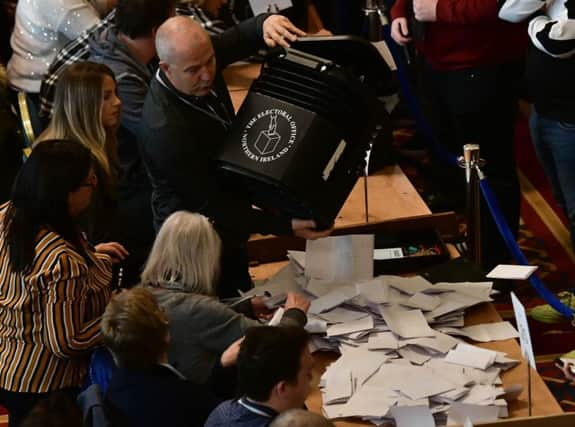Sam McBride: DUP cause for satisfaction but Sinn Fein much to ponder


Make your vote count in sending a message for or against a border poll, they said.
Yet the story of the first day of the election count has been the growth of the three parties which are the furthest from such tribalism — Alliance, the Green Party and People Before Profit.
Advertisement
Hide AdAdvertisement
Hide AdAll three are still modest players, far beneath the big beasts of local politics. But in Northern Ireland’s multi-party system where even the DUP at its zenith has only ever taken 36% of the vote, small parties can be influential not only in the chambers to which they are elected but in deciding which of the bigger parties’ candidates make it there.
The DUP and Sinn Féin remain dominant and there is scant evidence of sustained public move away from endorsing those parties, despite two years without Stormont and public anger at MLAs being paid while not legislating. That is quite an achievement for them.
The DUP has particular cause for satisfaction. After a torrid two years of scandal and internal spats, the party seems to have held its ground while smaller unionist parties have failed to do likewise.
Sinn Féin has more to ponder. Its 2017 performance, on the back of the RHI scandal, Brexit and nationalist fury at some Arlene Foster remarks, was stunning. But, based on yesterday’s partial results, the upward trajectory has been checked.
Advertisement
Hide AdAdvertisement
Hide AdA combination of People Before Profit, Aontú and Alliance — along with an SDLP which seems to have held its vote better than some pundits expected — has seen nationalist voters channel their dissatisfaction at the status quo in various directions.
But although the DUP will be happy with the first day of the election, there are glimpses of looming risks – but also opportunities for it.
The party’s selection of Alison Bennington as its first lesbian candidate was calculated and strategic.
The party would have expected a backlash, but might have been surprised at the severity of objections from some traditional supporters.
Advertisement
Hide AdAdvertisement
Hide AdVeteran Ballymena DUP councillor John Carson appealed for people to pray “that this person will not be elected”. Now that she has been elected and the party’s vote as a whole has held up, it is is evidence to bolster those within the DUP who have been arguing that it can liberalise its stance on social issues — at least cautiously — without support collapsing.
But beneath some of the headline numbers there are glimpses of future battles for the party if it moves in that direction.
In Bannside, the traditional DUP heartland which gave its name to founder Ian Paisley’s House of Lords title, the TUV saw its vote surge. Having taken two seats in 2014, the TUV consolidated that position. In what may be evidence of disquiet in some DUP heartlands, TUV saw its vote share rise from less than 28% last time to 36%.
That comfortably eclipsed the DUP’s 26.7% of the vote. TUV canvassers talked about the DUP’s first gay candidate being raised on doorsteps far away from where she was a candidate. If there is a significant backlash, that is likely to benefit of TUV leader Jim Allister in the European election in three weeks’ time.
Advertisement
Hide AdAdvertisement
Hide AdBut the story of the first day of this election count has been the growth of the centre ground. There have been points in the past where it appeared that voters would abandon parties defined by the constitution for a new form of politics. On each occasion, voters have gradually reverted to orange and green.
Twenty one years after the Belfast Agreement, the DUP and Sinn Féin framed this as a familiar orange-green contest. Ironically it was a terrorist murder –the sort the Agreement was meant to stop – which disrupted that message and may have persuaded some of those who voted for centrists that they want a different Northern Ireland.